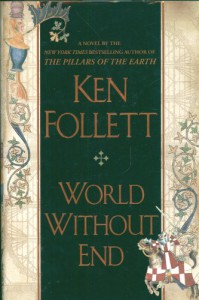World Without End
 While it is a book that consistently holds your interest, it is too similar to the first book in the series, Pillars of the Earth, to be as good. It was too repetitive, and at times it felt as if it was the same book, same theme, same plot, with only the names and dates changed. It takes place in the same part of the world, the characters, descendants of those in the first, are always in the same circumstances of danger or mystery as they were in the first book. Their problems are still insoluble.
While it is a book that consistently holds your interest, it is too similar to the first book in the series, Pillars of the Earth, to be as good. It was too repetitive, and at times it felt as if it was the same book, same theme, same plot, with only the names and dates changed. It takes place in the same part of the world, the characters, descendants of those in the first, are always in the same circumstances of danger or mystery as they were in the first book. Their problems are still insoluble.Wantonness in the area was rife, outlaws lived without fear, murder often went unnoticed or unpunished, unscrupulous behavior abounded, unwanted pregnancies were a common occurrence, secrets were a natural state of affairs, builders were still trying to build their dream, greed and jealousy controlled the townspeople and the clergy, the Church was corrupt, the Prior cruel, the nuns were subservient as were all women, the Noblemen were cruel and the townspeople, largely uneducated, often made foolish spur of the moment decisions for which they paid dearly for the rest of their lives. Injustice existed everywhere, as a natural and accepted course of events. There were the villains and the saints and they remained the same throughout this book with justice finally being achieved hundreds of pages later.
Perhaps reading four Ken Follett novels in a row was my mistake. The characters fell prey to the same error of ways as their ancestors and events were so totally predictable, it felt like a soap opera; time passes, but nothing really happens; one could stop watching, pick up years later, and still know the plot and the outcome. Then, of course, there is the fairy tale ending with everyone winding up accomplishing their dream of decades before.
The audio version had 36 parts making it a quite a task to complete. However, since the story continues with Caris and Merthin still in love, as in the first book, the reader is interested to find out what will happen to them. She doesn’t want to marry; it will take away her independence. He wants to settle down and have a family. What will they ultimately do? That is the question that continues to lure the reader onward.
Throughout the years they survive through the plague and its tragedies. They suffer through many unworthy accusations; he is accused of impregnating Griselda, the stepdaughter of Caris’ sister Alice; she is accused of being a witch. The reader will want to continue to read to find out what happens to scheming characters like Philemen, what Ralph and Godwin, and then to find out if Gwenda and Wulfric, and all the other unjustly treated characters, ever prevail. Will Merthin ever achieve his goals? What will ultimately happen to Caris? These are interesting questions but it takes an awfully long time, maybe a little too long, to reach the practically, fairy-tale like ending.
A friend mentioned that he really liked the series because of the theme about women’s rights that ran through the books. Another reviewer pointed out that there was no such thing as women’s rights, at that time, so he did not believe it had a legitimate place in the book. The readers will have to decide on that subject for themselves.
However, the history the author presents is well researched and very interesting. If the reader likes Follett’s style of writing, the book will not disappoint them, though the more than 1000 pages will be a chore to complete.


